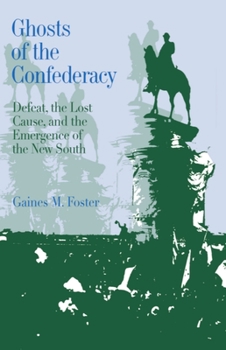Ghosts of the Confederacy: Defeat, the Lost Cause, and the Emergence of the New South, 1865 to 1913
Select Format
Select Condition 
Book Overview
After Lee and Grant met at Appomatox Court House in 1865 to sign the document ending the long and bloody Civil War, the South at last had to face defeat as the dream of a Confederate nation melted into the Lost Cause. Through an examination of memoirs, personal papers, and postwar Confederate rituals such as memorial day observances, monument unveilings, and veterans' reunions, Ghosts of the Confederacy probes into how white southerners adjusted to and interpreted their defeat and explores the cultural implications of a central event in American history. Foster argues that, contrary to southern folklore, southerners actually accepted their loss, rapidly embraced both reunion and a New South, and helped to foster sectional reconciliation and an emerging social order. He traces southerners' fascination with the Lost Cause--showing that it was rooted as much in social tensions resulting from rapid change as it was in the legacy of defeat--and demonstrates that the public celebration of the war helped to make the South a deferential and conservative society. Although the ghosts of the Confederacy still haunted the New South, Foster concludes that they did little to shape behavior in it--white southerners, in celebrating the war, ultimately trivialized its memory, reduced its cultural power, and failed to derive any special wisdom from defeat.
Format:Paperback
Language:English
ISBN:0195054202
ISBN13:9780195054200
Release Date:November 1988
Publisher:Oxford University Press
Length:306 Pages
Weight:0.64 lbs.
Dimensions:0.6" x 5.3" x 8.0"
Customer Reviews
2 ratings
Excellent, orginial work
Published by Thriftbooks.com User , 17 years ago
I can only restate what the previous reviewer has already stated--Gaines Foster should be lauded for the work presented here. Ghosts of the Confederacy is an excellent, absorbing look at the reaction to the Confederate defeat, the emergence of the Lost Cause in the post-war years, and the role of all of this as the New South emerged. The book looks at the years 1865-1913 and you get a real, full, detailed picture of the South and its reaction to the Civil War during that time. One of the most amazing things about this book is that the reactions of the originators of the Lost Cause are still heard today by so called neo-Confederates. The book is definitely academic, but I found it to be still very readable and engaging. If you have any interest in the post-war South or the Lost Cause, then pick this book up. You will not regret it.
How the South used the "Lost Cause"
Published by Thriftbooks.com User , 24 years ago
Dr. Foster provides an intriguing account of how the "Lost Cause" mutated to fit people's perceptions and needs. Confederate sentiments started and were celebrated as a form of nationalism, and idea that pulled the South together after the War. As time wore on, the "Cause" became more commercial as people come from all over to attend veterans celebrations and to see the monuments that seemed to spring up in every Southern town and city. Veteran and other organizations used reunions as a means to raise money. After the turn of the century Southerners used the "Lost Cause" to set themselves apart from the rest of the country. The emergence of the New South grew out of this newfound sense of being special and different. Although Foster's writing can be dry, he provides a cogent argument that would benefit anyone interested in the South after the Civil War.





